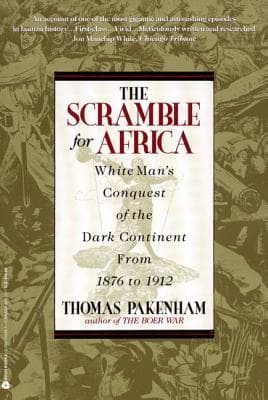
Book Review Summary: The Scramble for Africa: The White Man's Conquest of the Dark Continent from 1876 to 1912
Introduction
"The Scramble for Africa: The White Man's Conquest of the Dark Continent from 1876 to 1912" by Thomas Pakenham is a comprehensive and engaging book that delves into the European colonization of Africa during the late 19th century. This book offers a detailed account of the various factors that led to the scramble for Africa, including economic interests, political motivations, and the belief in the superiority of Western civilization. Through extensive research and vivid storytelling, Pakenham provides readers with a compelling narrative that captures the complexity and controversy surrounding this period of history.
About Thomas Pakenham
Thomas Pakenham, the author of "The Scramble for Africa," is an esteemed historian and arborist. He has written several acclaimed books on Victorian and post-Victorian British history and trees. Pakenham's extensive knowledge and passion for his subject matter shine through in this book, making it a valuable contribution to the field of African history.
Analysis of Views
- Historical Significance: Readers praise the book for its historical significance, as it provides a comprehensive overview of the European colonization of Africa during a critical period in world history. Pakenham's extensive research and attention to detail make this book a valuable resource for scholars and enthusiasts alike.
- Compelling Storytelling: Many readers appreciate Pakenham's storytelling abilities, as he brings to life the personalities and events that shaped the scramble for Africa. The book is engaging and accessible, making it enjoyable for both general readers and those with a background in history.
- Insightful Analysis: Pakenham's analysis of the various motivations behind the colonization of Africa is insightful and thought-provoking. He explores the complex interplay between economic interests, political ambitions, and ideological beliefs, providing readers with a deeper understanding of the factors that drove European powers to claim African territories.
- Balanced Perspective: Readers commend Pakenham for presenting a balanced perspective on the scramble for Africa. He acknowledges both the positive and negative aspects of colonialism, highlighting both the benefits and drawbacks of European expansion in Africa. This balanced approach allows readers to form their own opinions on this controversial topic.
- Engaging Narrative: The book's engaging narrative is another factor that contributes to its popularity among readers. Pakenham's storytelling skills keep readers engaged and invested in the events unfolding on the African continent. The personalities he introduces, such as Livingstone, Stanley, King Leopold, and others, come alive on the pages, making their stories compelling and memorable.
Reasons for Recommendation
- Comprehensive Overview: The book provides a comprehensive overview of the scramble for Africa, covering various aspects such as economic interests, political motivations, and ideological beliefs. This breadth of coverage makes it an excellent resource for those seeking a deeper understanding of this period in history.
- Compelling Storytelling: Pakenham's storytelling abilities make the book engaging and enjoyable to read. His ability to bring historical figures to life and weave their stories into a cohesive narrative makes it a compelling read for both general readers and history enthusiasts.
- Insightful Analysis: Pakenham's analysis of the various factors driving European colonization is insightful and thought-provoking. He provides readers with a deeper understanding of the complex interplay between economic interests, political ambitions, and ideological beliefs that shaped this period in history.
- Balanced Perspective: The book presents a balanced perspective on colonialism, acknowledging both the positive and negative aspects of European expansion in Africa. This balanced approach allows readers to form their own opinions on this controversial topic and encourages critical thinking about historical events.
- Engaging Narrative: The book's engaging narrative keeps readers invested in the events unfolding on the African continent. Pakenham's storytelling skills bring historical figures to life, making their stories compelling and memorable. This engaging narrative makes it easier for readers to connect with the events described in the book.
Reasons for Not Recommendation
- Length: Some readers find the book's length daunting, as it spans over 700 pages. While many appreciate the comprehensive coverage, others may find it challenging to sustain their interest throughout the entire book due to its length.
- Some Racist Language: A few readers have noted that Pakenham occasionally uses racist language or perpetuates stereotypes about Africans. While these instances are not widespread, they may be off-putting to some readers who value sensitivity and inclusivity in their historical narratives.
- Limited Focus on African Perspectives: Some readers feel that Pakenham's focus on European perspectives may limit the book's appeal to those seeking a more comprehensive understanding of African experiences during this period. While he does acknowledge African perspectives, some may feel that they are not adequately represented or explored in depth.
- Complexity: The scramble for Africa was a complex period with numerous interconnected events and players. Some readers find that Pakenham's attempt to cover everything in one book results in a somewhat disjointed narrative at times. While this does not detract from the overall quality of the book, it may require some patience and attention from readers to fully grasp all the details presented.
Conclusion
"The Scramble for Africa: The White Man's Conquest of the Dark Continent from 1876 to 1912" by Thomas Pakenham is a well-researched and engaging book that provides readers with a comprehensive overview of European colonization in Africa during the late 19th century. Through compelling storytelling, insightful analysis, and a balanced perspective, Pakenham presents a detailed account of the various factors driving European expansion in Africa. While some readers may find the length daunting or questionable language off-putting, overall, this book is highly recommended for those seeking a deeper understanding of this significant period in world history.